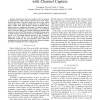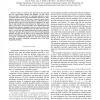16 search results - page 2 / 4 » Using Incompletely Cooperative Game Theory in Wireless Mesh ... |
FORTE
2010
13 years 6 months ago
2010
Wireless sensor networks are typically ad-hoc networks of resource-constrained nodes; in particular, the nodes are limited in power resources. It can be difficult and costly to rep...
GLOBECOM
2008
IEEE
13 years 11 months ago
2008
IEEE
—Game theory has been a useful tool for the analysis of random-access based wireless networks due to their decentralized operations. This paper studies one of the most widely use...
ICC
2007
IEEE
13 years 11 months ago
2007
IEEE
— There is a need for new spectrum access protocols that are opportunistic, flexible and efficient, yet fair. Game theory provides a framework for analyzing spectrum access, a ...
CORR
2010
Springer
13 years 4 months ago
2010
Springer
An important issue in wireless communication is the interaction between selfish and independent wireless communication systems in the same frequency band. Due to the selfish natur...
CCS
2009
ACM
13 years 11 months ago
2009
ACM
In mobile networks, authentication is a required primitive of the majority of security protocols. However, an adversary can track the location of mobile nodes by monitoring pseudo...


